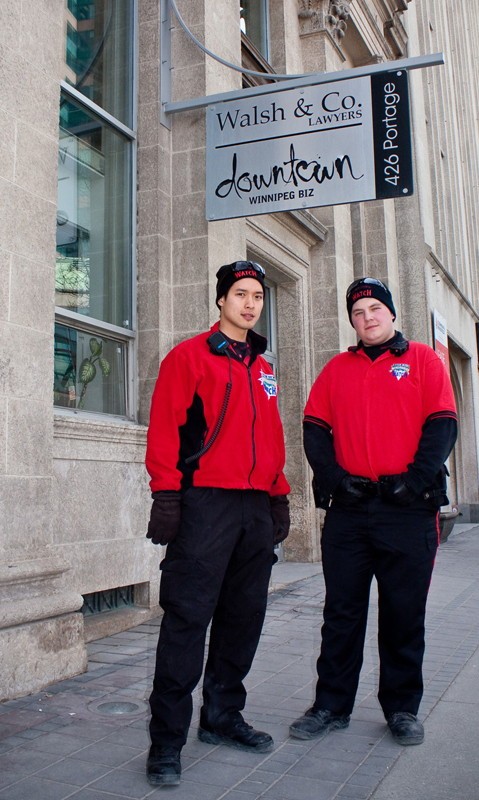Downtown BIZ hires new Watch ambassadors
Critics say BIZ programs are unaccountable, ineffective
The Downtown Winnipeg Business Improvement Zone (BIZ) hired 10 new red-shirted Watch ambassadors this summer for the upcoming Winnipeg Jets season, increasing the number of private security personnel on the streets of downtown from 14 to 24.
“Our services are broad,” said Stefano Grande, executive director of the Downtown BIZ, explaining that the new hires were necessary in order to ensure safety and security during peak afternoon and evening hours around the MTS Centre.
“From being friendly faces and ambassadors, to being extra eyes and ears in our downtown ... (we are) directly engaging with others in the community.”
Watch ambassadors have no powers of arrest and are simply there to alert paramedics and police in case of emergency. However, the BIZ’s other form of security, the Outreach patrol program, grants staffers special constable status to enforce the Intoxicated Persons Detention Act (IPDA).
In addition to the new Watch ambassador hires, Grande also insists that the BIZ’s Outreach program, which employs 10, should have its government funding renewed past the current 2012 expiry date.
Since its conception in 2006, Outreach has received government funding from the City of Winnipeg and the province. That funding is set to run dry due to the advent of the Winnipeg Police Service auxiliary cadets, who also have powers under the IPDA.
In an appeal to government and other interest groups in 2010, the Downtown BIZ recommended that funding for Outreach be extended to at least 2013, and that the boundaries of the program should be delineated by need in order to include the Health Sciences Centre hospital and other adjacent downtown neighbourhoods.
“People are dying in bus shelters in – 35 C (weather), they are dying of dehydration, causing public nuisance and creating a negative safety perception, as well,” said Grande.
“We’re right now working with the city and police program on how we would transfer our
Outreach program (diagnostics) into the cadets and what we would provide.”
However, the hiring of new Watch ambassadors, and the continued push by Grande and the BIZ to extend the Outreach program, is not sitting well with some.
Kelly Gorkoff, a University of Winnipeg criminal justice professor and an expert on poverty and social inequality, believes the two BIZ programs are simply ways of policing the poor.
“They are not a community support network offering assistance,” she wrote in an email.
“Instead, they move people around so business owners can operate without customers feeling fearful of street people.”
Gorkoff added that both programs have vaguely defined legal authority, leaving them open to abuse.
Rob McGregor, a member of Winnipeg Copwatch, a local activist group that keeps tabs on police conduct, agrees with Gorkoff.
“We have a separate police force that has zero accountability (and) no public record of anything they do,” he said.
Last September, The Uniter reported that McGregor had witnessed what he described as a physical assault by a Watch ambassador on Donald Street in downtown Winnipeg.
The BIZ later confirmed that the incident had taken place and that they were looking into it.
In attempting to make a formal complaint about the issue, McGregor ran into several roadblocks before realizing that the two programs do not fall under the jurisdiction of the provincial Law Enforcement Review Agency (LERA), which investigates complaints about police conduct in Manitoba.
However, Grande described the complaints process favourably, saying that they handle complaints about Watch ambassadors like any other company. Complaints move through the chain of command from manager to human resources, before finally hitting his desk, he added.
In the case of the Outreach patrol program, all complaints go to the Winnipeg Police Service and the police chief, Grande said.
Published in Volume 66, Number 2 of The Uniter (September 8, 2011)







